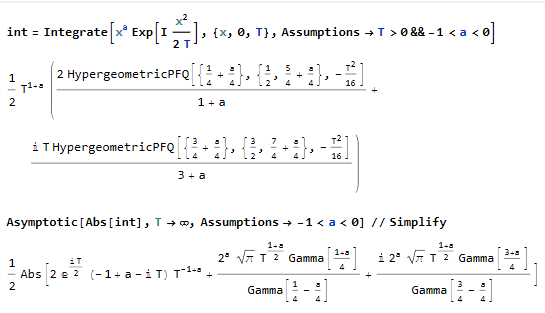$\newcommand\R{\mathbb R}\newcommand{\al}{\alpha}$If a function $h\colon\R\to\R$ is monotonic and does not change sign on an interval $[a,b]$, then it is easy to see (make a picture) that for all real $s$
\begin{equation*}
\Big|\int_{[a,b]}h(u)\sin(u+s)\,du\Big|\le3\sup_{c\in\R}\int_{[a,b]\cap[c,c+\pi]}|h(u)|\,du,
\end{equation*}\begin{equation*}
\Big|\int_{[a,b]}h(u)\sin(u+s)\,du\Big|\le\sup_{c\in\R}\int_{[a,b]\cap[c,c+\pi]}|h(u)|\,du,
\end{equation*}
whence
\begin{equation*}
\Big|\int_{[a,b]}h(u)e^{iu}\,du\Big|\le6\sup_{c\in\R}\int_{[a,b]\cap[c,c+\pi]}|h(u)|\,du.
\end{equation*}\begin{equation*}
\Big|\int_{[a,b]}h(u)e^{iu}\,du\Big|\le\sqrt2\,\sup_{c\in\R}\int_{[a,b]\cap[c,c+\pi]}|h(u)|\,du.
\end{equation*}
Since $x^\al/F'(x)$ is monotonic in $x\in[1,T]$, $F'$ cannot change its (nonzero) sign on $[1,T]$. Making now the substitution $u=F(x)$, letting here
\begin{equation*}
h(u):=\frac{g(u)^\al}{F'(g(u))} \text{ with } g:=F^{-1},
\end{equation*}
and then making the inverse substitution $x=g(u)$, we get
\begin{equation*}
\begin{aligned}
I_\al(T)=
&\Big|\int_{F([1,T])}h(u)e^{iu}\,du\Big| \\
&\le6\sup_{c\in\R}\int_{F([1,T])\cap[c,c+\pi]}|h(u)|\,du \\
&=6\sup_{c\in\R}\int_{[1,T]\cap g([c,c+\pi])}x^\al\,dx.
\end{aligned}
\tag{1}
\end{equation*}\begin{equation*}
\begin{aligned}
I_\al(T)=
&\Big|\int_{F([1,T])}h(u)e^{iu}\,du\Big| \\
&\le\sqrt2\,\sup_{c\in\R}\int_{F([1,T])\cap[c,c+\pi]}|h(u)|\,du \\
&=\sqrt2\,\sup_{c\in\R}\int_{[1,T]\cap g([c,c+\pi])}x^\al\,dx.
\end{aligned}
\tag{1}
\end{equation*}
Recall that $F'$ cannot change its (nonzero) sign on $[1,T]$.
If $F'>0$ on $[1,T]$, then for any $x,y$ in $[1,T]$ such that $x\le y$ \begin{equation*} |F(y)-F(x)|=F(y)-F(x)\ge\frac{(y-x)^2}{2T}, \end{equation*}\begin{equation*} |F(y)-F(x)|=F(y)-F(x)\ge F'(x)(y-x)+\frac{(y-x)^2}{2T}\ge\frac{(y-x)^2}{2T}, \end{equation*} since $F'>0$ and $F''\ge1/T$.
Similarly, if $F'<0$ on $[1,T]$, then for any $x,y$ in $[1,T]$ such that $x\le y$ \begin{equation*} |F(y)-F(x)|=F(x)-F(y)\ge F'(y)(x-y)+\frac{(x-y)^2}{2T}\ge\frac{(y-x)^2}{2T}, \end{equation*} since $F'<0$ and $F'>0$$F''\ge1/T$.
So, \begin{equation*} |g(c)-g(c+\pi)|\le\sqrt{2\pi T}, \end{equation*} in either case, $|y-x|\le\sqrt{2T|F(y)-F(x)|}$ for any $x,y$ in $[1,T]$. So, denoting by $l$ the length of the interval $[1,T]\cap g([c,c+\pi])$, we have $l\le\sqrt{2\pi T}$. and henceHence, by (1), \begin{equation*} I_\al(T) \le6\int_0^{\sqrt{2\pi T}}x^\al\,dx = \frac C{1+\al}\, T^{(1+\al)/2}, \end{equation*}\begin{equation*} I_\al(T) \le\sqrt2\,\int_0^{\sqrt{2\pi T}}x^\al\,dx \le\frac C{1+\al}\, T^{(1+\al)/2}, \end{equation*} whence $C$ is a universal positive real constant.
The latter bound is indeed an improvement of the corresponding bound in your post.
Morever, the latter bound is optimal, as it is asymptotically attained (as $T\to\infty$, up to a positive real constant factor depending only on $\al$) if $F(x)=\dfrac{x^2}{2T}$:

